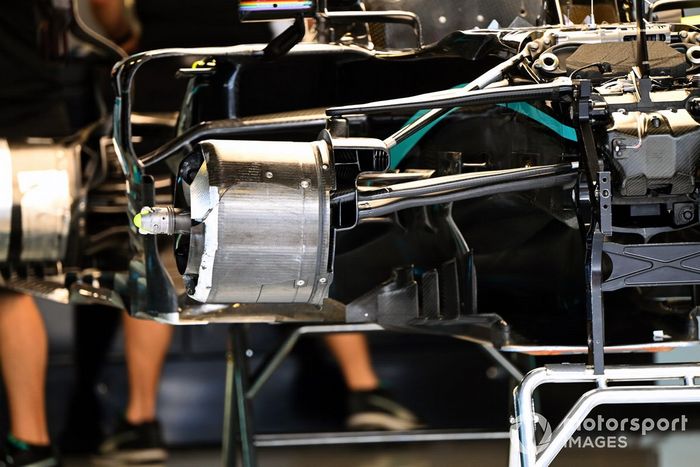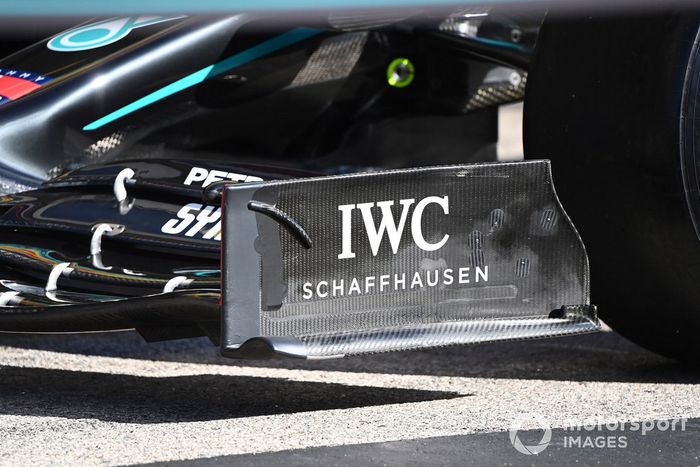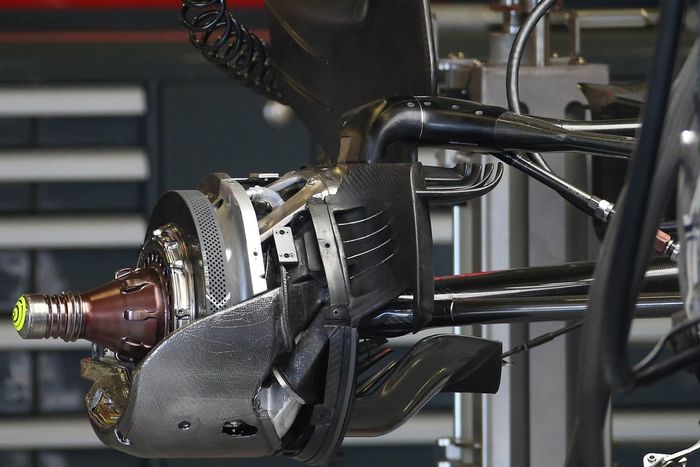Ferrari has a new front brake assembly on the SF1000, although it remains to be seen if it’s part of the package being assessed for next year's car. The drum tapers in toward the outboard end and has a series of airflow control fins mounted on the edge, in a similar fashion to their treatment of the rear brake drum. Teardrop-shaped outlets allow heat to escape through from the inner assembly to help warm the wheel rim and tyres.
Here we can see the experimental floor tested by Ferrari in Portugal as the team looks to get an early indication of how it will be affected by the 2021 regulation changes. The floor has a portion cut away as required by next year's regulations but interestingly it has rolled up the latter part of the floor.
Ferrari also modified the brake duct winglets and diffuser strakes to represent the ones that will be used next season. The new regulations will require that the brake duct fins be no more than 40mm wide and the diffuser strakes be more than 50mm above the reference plane.
Following on from testing its 2021 specification parts, Ferrari began running with a new floor with a returning feature – three outwardly-angled fins mounted ahead of the rear tyre. It’s a solution used in 2019 but had been abandoned this season, just as many of rivals had started to use them.
Mercedes tested without DAS during Free Practice in Portugal to evaluate the car without the system as they will be unable to use it next season.
A look at the W11’s front brake assembly without the brake drum attached reveals some of the inner channels used to cool the brakes and provide aerodynamic assistance.
A shot of the W11’s front brake assembly with the brake drum fairing attached gives an indication of how those channels are used to place and shape the airflow passing through.
A look at Mercedes front wing, which has an upturned footplate nozzle that the team introduced a few races ago, improving the consistency of the airflow captured as the car pitches forward under braking.
An overview of the front wing specification introduced by Mercedes in Mugello that features a different treatment of the flap tips.
The rear brake ducts on the VF20 which, although similar to Ferrari, differ in construction. Also note the upwash strikes on the lower element of the rear wing endplate in the background.
McLaren continues to assess the new nose design introduced several races ago and that follows a similar design concept that Mercedes has run since 2017.
A good shot of the SF1000’s newer rear wing specification, which Ferrari introduced at the Nurburgring and features an adventurous endplate design with varying thicknesses to allow the designers to combine the upwash strikes and hanging vane holes. Note how the endplate also has a U-shaped rail on the inside edge too, in order to help guide the airflow coming through the holes made in the hanging section.
The side view affords another opportunity to see how the endplate has been contoured to allow for the upwash strikes.
The bargeboard cluster and sidepod deflectors on the Renault RS20 were updated a few races ago, with the deflector given the venetian blind-like update that many of the teams now run.
As the mechanics work on the RB16 we are treated to an exposed view of the inboard suspension elements and a great view of the contoured leading edge of the floor, complete with the six strakes that align the airflow either side of the car.
The flapped section on the edge of the W11’s floor is taped over so it doesn’t get damaged during transportation.
A close up of the upper half of the Mercedes W11’s rear wing endplate shows how the surfaces are contoured to allow for the double upwash strike arrangement on the rear half.
This shot of the Mercedes W11 gives a good appreciation of the path the airflow has to take to navigate its way down the car, with the various surfaces that surround the sidepod helping to manage their direction and setting up flow structures that interact with one another.
An extreme close up of the vertical fins used by Mercedes to direct airflow atop the footplate of the bargeboard cluster.
McLaren with flo-viz paint sprayed on the front suspension and bargeboard cluster as the team continues to assess the merits of its latest new parts.



































Top Comments